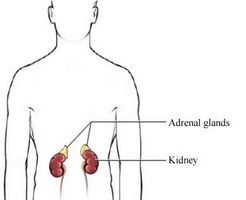[su_divider top=”no” style=”double” divider_color=”#952524″ link_color=”#952524″ size=”2″ margin=”10″]
What is Conn Syndrome? How to manage it? What are the precautions to be taken? What are the signs and symptoms? What is the cause of this disease? How to treat it? How can homeopathy help you? All of this answered, in this post and of course our doctors always there to help you. Just fill in your details in the form down below and we will answer all your questions for FREE!
[su_divider top=”no” style=”double” divider_color=”#952524″ link_color=”#952524″ size=”2″ margin=”10″]
[sc name=”query”]

What is Conn Syndrome?
Conn syndrome is an aldosterone-producing adenoma. Conn syndrome is a benign adenoma in one of the adrenal glands produces and secrets an excessive level of aldosterone. Conn’s syndrome is also known as primary hyperaldosteronism.
In aldosterone-producing adenoma the excessive secretion of aldosterone hormone promotes the reabsorption of sodium at the renal tubules, which then lead water to be absorbed in the body, which then finally leads to increased total blood volume, therefore, resulting in hypertension. As the sodium is reabsorbed, potassium is pumped out. This results in hypokalaemia in the patient along with hyperaldosteronism.
Who is more prone to get affected with Conn’s syndrome?
Conn’s syndrome is more prevalent in men than in women. Prevalence of occurrence is 2:1, men: women.
Conn’s syndrome occurs more in the age group of 30-50 years.
Individuals of any race can be affected by Conn’s syndrome.
What causes Conn’s syndrome?
Primary hyperaldosteronism has many causes, one of the cause is adrenal hyperplasia and adrenal carcinoma.
The syndrome is due to
• Bilateral adrenal hyperplasia
• Glucocorticoid-remediable hyperaldosteronism
• Renin-angiotensin system disorders
• Adrenal adenoma
What are the signs and symptoms of Conn’s syndrome?
Symptoms presented in Conn syndrome
• lethargy
• Muscle weakness
• Muscle cramps
• Cardiac arrhythmias
• Hypertension
• Hypokalaemia
• Polyuria
• Polydipsia
How to diagnose Conn’s syndrome?
Laboratory investigations to be done are as follows
• Plasma aldosterone
• Plasma renin activity ratio
• The ratio of renin and aldosterone if greater than 30 is indicative of primary hyperaldosteronism
• Urinary potassium
• ECG
In the imaging studies following are helpful
• CT scan
• MRI
• Captopril test
• Adrenal venous sampling.
What treatment is advised for Conn’s syndrome?
In patients who are suffering from the single benign tumor are removed surgically.
Drugs like spironolactone or eplerenone, drugs that block the effect of aldosterone are advised for hyperplasia patients.
Is Conn’s syndrome curable?
The prognosis of this condition is good for the patients, however, the majority of the patients need to continue anti-hypertensive therapy for the rest of their lives.
In the absence of proper treatment, individuals with
hyperaldosteronism often suffer from poorly controlled high blood pressure, which may be associated with increased rates of stroke, heart disease, and kidney failure.
What are the complications of Conn’s syndrome?
• Deep tendon reflexes are lost.
• Due to an increase in blood pressure heart disease may occur.
• Congestive heart failure
• Coronary artery disease
• Abnormal heart rhythm due to low potassium levels.
What is the differential diagnosis of Conn’s syndrome?
• Familial hyperaldosteronism type 1
• Syndrome of apparent mineralocorticoid excess
• Secondary hyperaldosteronism
• Any condition resulting in hypokalaemia
• Liddle syndrome
For more information, you can visit Wikipedia and NetDoctor.
Conn syndrome
[su_divider divider_color=”#952524″ link_color=”#952524″ size=”2″ margin=”10″]
[sc name=”know-your-doctor”]
[sc name=”more-links-diseases”]

